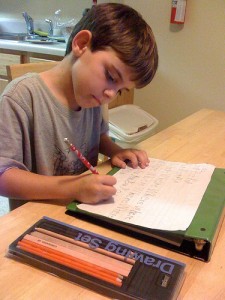Manic: Me one recent evening when I returned from a dinner out for my birthday and realized that my daughter’s homework was in my car the entire evening…and it was due in the morning. Yikes!
Managed: My daughter who woke the next morning at 5:30 am (on her own) to do the assignments that I unknowingly took with me to dinner! I told her that we shared the blame because it is her responsibility to bring her homework in the house, but that I should have also made sure that she had her studies before I left her with the babysitter! So in any event, check out these awesome homework tips for our kids…and for us parents…by our managedmoms.com writer and school teacher Lisa.
Lisa says:
Getting back into the school routine can be difficult, especially when it comes to homework. Whether your child is an eager beaver or a constant procrastinator, establishing a routine is essential. By establishing a set routine right away it can eliminate some of the chaos and allow for much calmer evenings and mornings in your house.
Here are some helpful tips for homework and establishing a routine:
*DO set a regularly scheduled time to do homework. This will depend on your child. Each child is different so their routine should be based on their individual learning styles and needs. Some kids can come home eat a snack, and dive right in. While others need time to unwind, run around and blow off some steam first. Having a set time and routine will provide much needed structure.
*DON’T over-schedule your child. Homework and school should not take a back burner to extra-curricular activities. While extra curricular activities are important for a child’s overall growth, be sure to allow for enough time for homework and ample rest. Make sure children understand homework is not negotiable, whether or not it is graded. Just as we have jobs to do, homework and schoolwork is a child’s job and
their responsibility.
*DO have a designated area for them to do homework in. Have all the needed supplies (paper, pencils, scissors, colored pencils, etc) so that students can get to work without delay. Have their space be centrally located so you are nearby to monitor their progress, but not so close that you are hovering, or your child feels they need to ask for help or assistance for every little piece. I find that by doing my chores nearby (paying bills, checking email, folding laundry), my child sees that I’m busy too, but am available when he really needs assistance.
*DON’T do your child’s work for them. The purpose of homework is to enforce responsibility and teach organizational skills (like time management) while reinforcing what they have learned at school. You are there to provide clarification or extra examples, but the work needs to be their own. Guide them as needed, but let your child feel the pride in learning a difficult concept, and boost of confidence knowing they did it on their own.
*DO let the teachers know if your child is still struggling with their homework after trying their best. Teachers may have suggestions or strategies that can end the homework battle, or modify the amount or type of work your child brings home to better meet their needs.
*DON’T assume your child has no homework. Familiarize yourself with teacher expectations, class websites and guidelines regarding homework. Always have your child show you their homework planner. Check backpacks for correspondences, graded work, and discuss what happened at school. By doing this daily it quickly becomes part of your routine and expectation of your child. Help children learn how to use their planners to organize and plan for long term projects, by breaking down assignments/projects into smaller chunks. If they truly have no homework, use the time to play an educational game or read.
*DO give your child choices and allow them to take the lead on homework. Let them choose which activities to start with. Let them be part of the decision making for this routine. Some children like to complete all homework in one session, while others prefer to break it into smaller sessions allowing for breaks. Encourage independence, because independence fosters confidence. Praise them for their hard work and efforts.
*DON’T allow distractions to interfere with homework. Some children work well with background music, while others need a quiet place to concentrate. Turn off TVs and cell phones to create an environment conducive for learning.
*DO check your child’s homework and sign off on their planner. Have them place their papers in the correct folders or binder and put it in their backpack along with their textbooks. This one simple step will prevent the child from leaving completed homework at home. It will also avoid chaos in the morning when you’re trying to leave on time!
What are your tried and true homework tips? Share with us here in the comments section.
About our writer, Lisa Walton:
Lisa Walton–Parenting tips, Valley Teacher and Mother
Lisa Walton has been a teacher in the Valley for over 18 years. She holds a Bachelor’s Degree in Deaf Education from Illinois State University; and Master’s Degree in Special Education from Arizona State University. She currently works as an itinerant teacher, collaborating with regular education teachers in the public schools.








